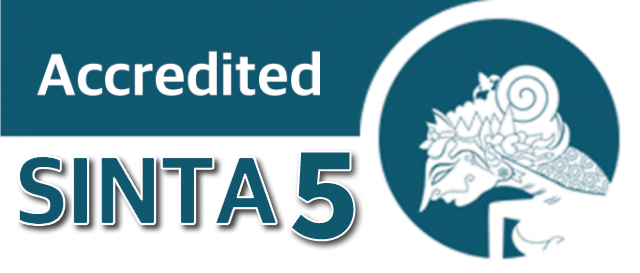HUBUNGAN PEMANFAATAN TEKNOLOGI DENGAN KECERDASAN SPIRITUAL PERAWAT DI RUMAH SAKIT SANTA ELISABETH MEDAN
Abstract
Background : Nurses who are spiritually intelligent are able to position
behavior, assess health measures given, be able to place feelings and
face busy work and try to be responsible at work. Reducing work
density, nurses take advantage of technology that can provide
changes in terms of helping work, communication and so on so that
the nurse's time to patients is more
Methods: The study design used an analytic survey design with cross sectional
method. Sampling using probability sampling with a Systematic
sampling technique with a sample size of 58 people. The instrument
used in this study was a questionnaire
Results: The results showed that the use of nurse technology was good
(94.8%), the spiritual intelligence of nurses was high (58.6%).
Elisabteh Health Journal : Jurnal Kesehatan, Vol. V No. 02 (Desember, 2020) : V-02 E-ISSN 2541-4992
Discussion: In hospital services nurses must be able to utilize existing
technology as reformers and be competitive in the world of health
and be able to place spirituality: their feelings and emotions in
providing nursing care to ensure an increase in the quality of
hospital services
References
Azizah, N. L. N., & Setiawan, M. V. (2017). Pengelolaan Informasi Kesehatan secara Terintegrasi untuk Memaksimalkan Layanan Kesehatan kepada Pasien di Rumah Sakit. Indonesian Journal of Pharmaceutical Science and Technology, 4(3), 79-91.
Bagherian, B., Sabzevari, S., Mirzaei, T., & Ravari, A. (2017). Effects of technology on nursing care and caring attributes of a sample of Iranian critical care nurses. Intensive and Critical Care Nursing, 39, 18-27.
Creswell, J. W. (2009). Research Design: Qualitative, Qantitative, and Mixed Methods Approaches. USA: SAGE Publication.
Damayati, D. S., Rusmin, M., & Arranury, Z. (2015). Gambaran Penerapan Sistem Informasi Manajemen Kesehatan Berbasis WEB di Puskesmas Kota Makassar Tahun 2015. Al-sihah: The Public Health Science Journal, 7(2).
Fashi, F. M. (2017). Studying the relationship between spiritual intelligence of nurses and patients' satisfaction with nursing care. Bali Medical Journal, 6(3), 539-542.
Grove, Susan K. (2015). Understanding Nursing Research Building an Evidence Based Practice 6th Edition. China : Elseiver.
Hakam, F. (2017). Analisis Sistem Dan Teknologi Informasi Sebagai Acauan Dalam Perancangan Rencana Strategis Sistem Informasi Dan Teknologi Informasi (Renstra Si/Ti) Di Rumah Sakit Islam Yogyakarta Pdhi. Jurnal Sistem Informasi, 9(1).
Lesmana, D. (2014). Kecerdasan spiritual dengan kecemasan menghadapi masa pensiun. Jurnal Ilmiah Psikologi Terapan, 2(1), 168-183.
Locsin, R. C., & Ito, H. (2018). Can humanoid nurse robots replace human nurses?. Journal of Nursing, 5(1), 1.
Manganello, J., Gerstner, G., Pergolino, K., Graham, Y., Falisi, A., & Strogatz, D. (2017). The relationship of health literacy with use of digital technology for health information: implications for public health practice. Journal of public health management and practice, 23(4), 380-387.
Mishra, P. R. A. T. I. M. A., & Vashist, K. A. M. L. A. (2014). A review study of spiritual intelligence, stress and well-being of adolescents in 21st century. International Journal of Research in Applied Natural and Social Sciences, 2(4), 11-24.
Moller, A. C., Merchant, G., Conroy, D. E., West, R., Hekler, E., Kugler, K. C., & Michie, S. (2017). Applying and advancing behavior change theories and techniques in the context of a digital health revolution: proposals for more effectively realizing untapped potential. Journal of behavioral medicine, 40(1), 85-98.
Nursalam. (2014). Metodologi Penelitian Ilmu keperawatan Pendekatan Praktis, Edisi 3. Jakarta: Salemba Medika.
Rahmawati, U. (2016). Pengembangan Kecerdasan Spiritual Santri: Studi terhadap Kegiatan Keagamaan di Rumah TahfizQu Deresan Putri Yogyakarta. Jurnal Penelitian, 10(1), 97-124.
Ridwansyah, R., & Kurniawati, T. (2014). Hubungan kecerdasan spiritual dengan perilaku caring perawat di bangsal rawat inap Marwah dan Arafah RS PKU Muhammadiyah Yogyakarta (Doctoral dissertation, STIKES' Aisyiyah Yogyakarta).
Saputra, E. (2014). Analisis Penerimaan Sistem Informasi Manajemen Rumah Sakit Umum Daerah Bangkinang Menggunakan Metode Technology Acceptance Model (TAM). Jurnal Sains dan Teknologi Industri, 10(2), 229-235.
Saputra, G. W., Rivai, M. A., Su’udah, M., Wulandari, S. L. G., Dewi, T. R., & Fitroh, F. (2017). Pengaruh Teknologi Informasi Terhadap Kecerdasan (Intelektual, Spiritual, Emosional Dan Sosial) Studi Kasus: Anak-Anak. Studia Informatika: Jurnal Sistem Informasi, 10(2).
Silfi, Dhia D. (2014). Pengaruh Ilmu Pengetahuan dan Teknologi Di Bidang Kesehatan. Jurnal Kesehatan, 8(2).
Umamit, R., & Mulyani, S. (2016). Hubungan Antara Kecerdasan Spiritual Sengan Stres Kerja Pada Perawat RS Di Klaten. Jurnal Fakultas Hukum UII, 21(1).
Wahyuni, R., Mayangsari, M. D., & Fauzia, R. (2017). Hubungan Kecerdasan Spiritual Dengan Perilaku Prososial Pada Perawat Di Rumah Sakit Islam Banjarmasin. Jurnal Ecopsy, 3(3).
Yani, A. (2018). Utilization Of Technology In The Health Of Community Health. Promotif: Jurnal Kesehatan Masyarakat, 8(1), 97-103.












